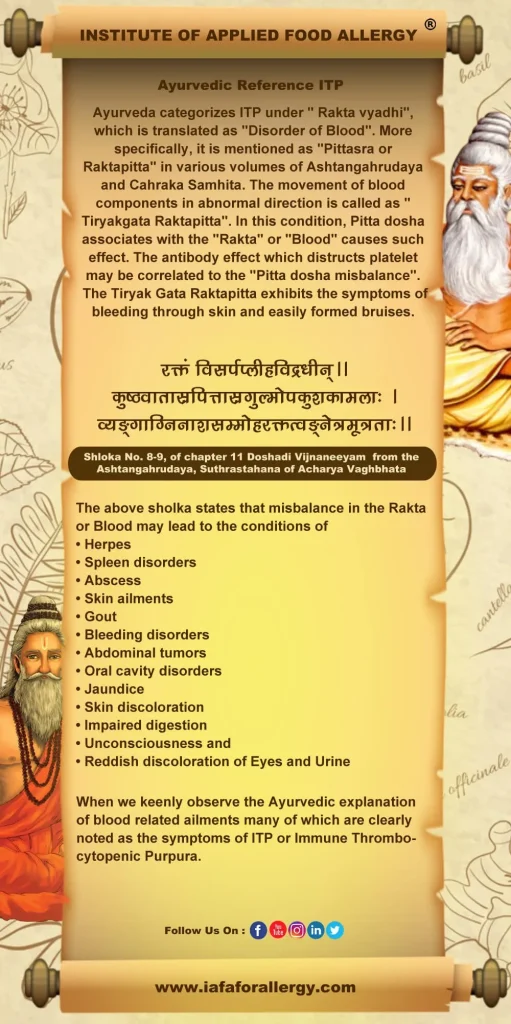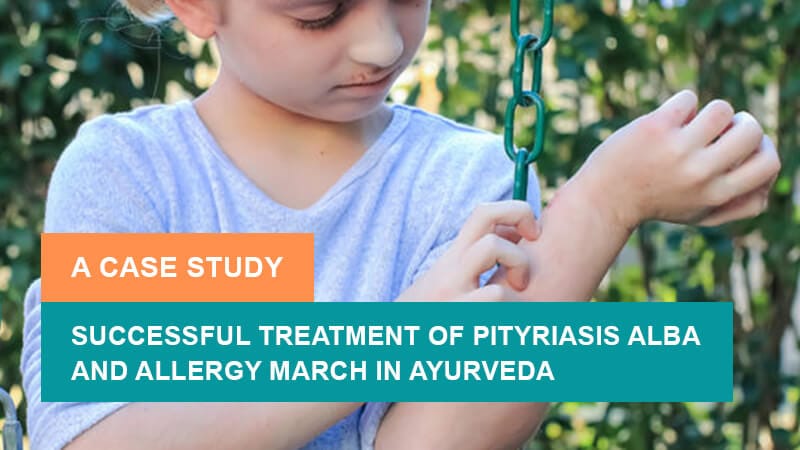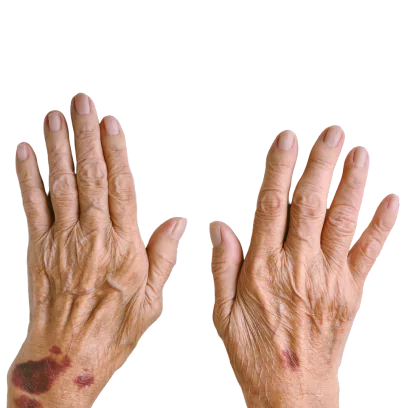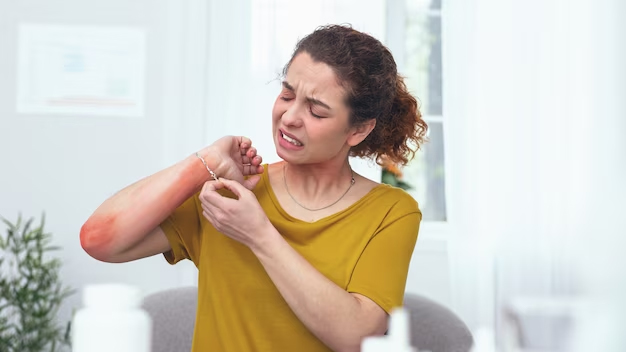On This Page
Idiopathic Thrombocytopenic Purpura (ITP) : Symptoms, Causes, Types, Do’s, Don’ts, Yoga, Ayurvedic Reference and Treatment: Complete Ayurveda Details
रक्तं विसर्पप्लीहविद्रधीन् ॥
कुष्ठवातास्रपित्तास्रगुल्मोपकुशकामलाः ।
व्यङ्गाग्निनाशसम्मोहरक्तत्वङ्नेत्रमूत्रताः ॥
Idiopathic Thrombocytopenic Purpura (ITP) is a disorder of blood characterized by the low number of platelet cells in the blood. It is also known as Immune Thrombocytopenic Purpura. Platelets are known for their blood clotting action. Bleeding in the gums, abnormal internal bleeding, and easy bruises can be caused by the low number of platelets or Immune thrombocytopenic purpura.
Ayurveda classifies, ITP under “Rakta vyadhi”, which means disorders of the blood. Ashtagahrudaya is having clear reference of “Pittasra” or “Raktapitta” under the volumes of Sutrasthana, Nidanasthana, and Chikitsasthana.
The weak immune is responsible for this condition and it is classified as an autoimmune disease. The condition in which one’s own immune system acts against the organism is called an Autoimmune condition. In the case of ITP disease, the platelet counts are decreased due to weak immune system action. Ayurveda is the ultimate solution for the management of ITP.
Causes of ITP
The stimulation caused to the immune system to destroy it’s own cells may lead wide range of conditions and one among which is called as ITP. In case of ITP, different reasons have been found out.
- Medications
- Infections like HIV, Hepatitis C or Chicken pox may lead to severe damage of immune system and may lead to conditions like ITP
- Other immune disorders like Lupus or Rheumatoid arthritis
- Pregnancy
- Certain conditions like Leukemia may produce antibodies against platelets and
- Many cases have remained Idiopathic
Symptoms of ITP
In general, the laboratory value of Platelet is 150000 to 450000 cells per one microlitre of blood. When the count is lower than 150000 the risk of bleeding increases. The count near or less than 10000 cells may lead to the establishment of the clear symptom of bleeding.
The major symptoms of ITP or Immune Thrombocytopenic Purpura includes,
- Small blood spot
- Purple discoloration of skin
- Heavy menstrual periods or per vaginal bleeding
- Nasal bleeding or nose bleeding
- Blood strains in stool, urine as well as vomit
- Bleeding of gums and
- Radiological observation of internal bleeding inside the head
Ayurvedic Reference ITP or Idiopathic Thrombocytopenic Purpura (Tiryaka Raktapitta)


“IAFA® is the leading Ayurvedic institution in the successful management of a wide range of immune system-related conditions like ITP or Idiopathic Thrombocytopenic Purpura. Our team of doctors are having a special research wing under which various studies have been conducted for finding the evidence based Ayurveda medicine usage. With years of experience we are successfully helping people around the globe in treating conditions through the natural friendly measures of Ayurveda. Institute of Applied Food Allergy® is also having high successful rates in the management of immune system related cases, allergic disorders and skin ailments.”
Visit IAFA and feel the real difference!
– Dr. Sahil Gupta (B.A.M.S., M.H.A.)
Ayurvedic Allergy Specialist
CEO & Founder of IAFA®
At last, Easier ITP Management

Trusted by
More than 90,000 Patients

Convenient
at-Home Treatments

9.2 / 10
Customer Satisfaction Score
Ayurvedic Treatment of Idiopathic Thrombocytopenic Purpura (ITP)
Ayurvedic treatment of Idiopathic Thrombocytopenic Purpura (ITP) followed at IAFA is comprised of classical Ayurvedic methods as well IAFA developed methods using Ayurvedic combinations.
The Internal Medications:
- Vasa Grutham or Vasa Ghrita
- Drakshadi Lehyam
- Pravala bhasma and Shankha bhasma
The Single Herbs Used are:-
- Giloy (Tinospora cordifolia)
- Sariba (Hemidesmus indicus)
- Vasa (Adhatoda vasica)
- Bhumi Amalaki (Phyllanthus Niruri)
- Changeri (Oxalis Corniculata)
- Haridra (Curcuma longa) and
- Ashwagandha (Withania Somnifera)
Diet in ITP
Do’s (Pathya)
- Intake of Vegetarian diet for the period of Ayurveda treatment
- Warm or room temperature food intake
- Adding cool perfumes of Rose or Lavender to room or clothings
- Consuming Papaya, Mango, Pomegranate and Dried grapes (Raisins)
- Wearing of light and pleasant clothes
- Intake of moderately Sweet taste, Bitter taste and Astringent taste can be practised
Don’ts (Apathya)
- Avoid hot food and drinks
- Avoid Sour, Salt and Spicy taste for the period of Ayurveda treatment
- Avoid overexertion and avoid taking heavy loads
- Avoid being under sunlight for long duration
- Avoid taking hot water bathing
Yoga for Management of ITP
Yoga measures like Pranayama and teacher-guided Shat Kriyas are highly beneficial in the management of ITP or Idiopathic Thrombocytopenic Purpura.

Frequently Asked Questions
Question: What is ITP according to Ayurveda?
Answer: ITP is categorized under Raktpitta in Ayurveda which is a blood disorder mentioned in ancient classical Ayurvedic texts. All the doshas especially Pitta dosha is vitiated resulting in the imbalance of the rakta dhatu (blood tissue) and agni (digestive fire).
Question: Can Ayurveda treat ITP?
Answer: ITP can be successfully treated through Ayurveda. There are various herbs and herbal remedies that are beneficial in the successful treatment of ITP.
Question: Is Ayurvedic treatment of ITP safe?
Answer: Ayurvedic treatment of ITP is completely safe and effective. It works on the root cause of the problem and balances the doshas.
Was this Page Helpful?
So IAFA Root-Cause Treatment for Your ITP is Just 3 Steps Away!

01. Connect With Us
Share your history of illness or Book your appointment

02. Consult With Us
Dr. Gupta a certified Ayurvedic Allergist Consultant

03. Root Cause Treatment
Get an accurate diagnosis, medicines, diet & lifestyle change
ITP – Case Studies
Real Case Studies of Successfully Treated Patients from All Around the World by IAFA Ayurveda®
-

Successful Treatment of Pityriasis Alba and Allergy March in Ayurveda – A Case Study
It is a case study about successful treatment of Pityriasis Alba and…
-

Successful Treatment of Gallstones (Cholelithiasis) with Ayurvedic Medications – A Case Study
It is a case study about the successful treatment of Gallstones (Cholelithiasis)…
-

48-Year-Old Male Patient Got Relief from Chronic Aspergillosis of Paranasal Sinuses – A Case Study
Fungal infections can be treated with a high success rate by various…
-

6-Year-Old Child Patient Got Relief from Gluten Intolerance and Wheat Allergy – A Case Study
It is a case study of a 6-year-old Child Patient who got…











